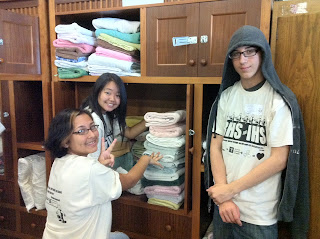Last night, FACE (Faith Action for Community Equity) and St. John Vianney Parish in Kailua co-sponsored a panel discussion on homelessness and the community’s response.
The conversations were robust and relevant, although there were a small number of conflicting ideas. One City Council member is suggesting retrofitting shipping containers to serve as temporary (max 5 years) homes for those currently homeless, and several individuals that were present were proponents of 'tent cities' - establishing 'safe' zones where people that are homeless and camping can do so legally.
Other (more popular) ideas centered around TOD, or Transit-Oriented Development, as well as Housing First, which follows the idea that by first housing someone who is chronically homeless, and then wrapping them with services, the likelihood that they will be successful is increased dramatically. And of course, subsidy programs such as TANF and Shelter + Care were discussed and praised for their effectiveness. In the words of Marc Alexander, the state's appointed Homeless Coordinator, "Renter/landlord subsidy programs integrate people in the right way - they don't create ghettos, whether you call them tent cities or other structures."
How does IHS, a homeless services provider feel about these ideas? For the record, IHS is very supportive of both TOD and Housing First. We are not supportive of tent cities, as they are not best practice and research shows that they are not successful. Never mind the fact that a tent city would attract more homeless individuals and families to the island and therefore defeat one of the purposes of establishing them in the first place.
IHS really believes that Hawaii as a whole needs more affordable housing - and not just for the poorest of the poor, but for the whole spectrum of individuals, couples and families. We already have emergency and transitional shelters. There's also public housing and a small scattering of affordable rentals (though the supply is diminishing each year). We need more affordable rentals, as well as workforce housing - for those making minimum wage and are currently having to work 70+ hours a week just to afford a modest studio rental.
We could talk about this all day, but we'll close with this call to action - in the words of Jun Yang, FACE's housing organizer, "Talk to your Representatives, your Senators, your City Council members - about what affordable housing means to YOU." It's true - it means something different to each of us. And every one of us can spare 5 minutes to pick up the phone and make a call.
Don't know how to get in touch with them? Here's a link to their numbers - don't waste another minute; call today! Your comments DO make a difference.


